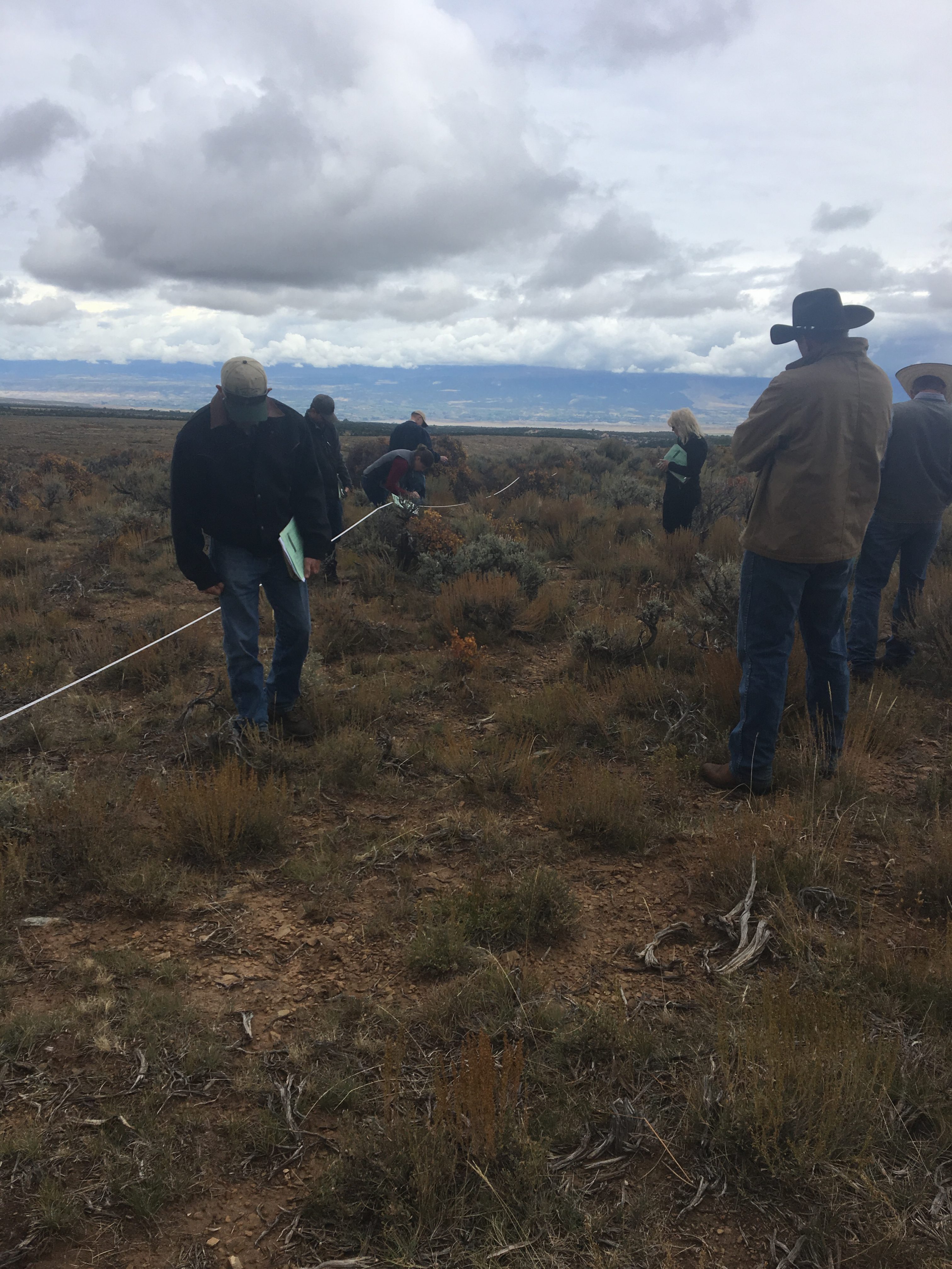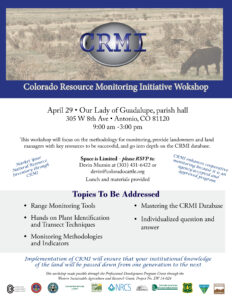Final Report for EW14-024
Project Information
The main goal of the Western SARE grant project titled “Colorado Resource Monitoring Initiative- Professionals Training" was to have more agency personnel and key leaders aware of the Colorado Resource Monitoring Initiative (CRMI) program through the Colorado Cattlemen’s Association (CCA). Through their awareness and understanding of the program, agency personnel and other professionals could promote to stakeholders and landowners/managers. This grant has enabled CRMI principles to be taught to federal agency, state agency, extension, NRCS and other rangeland professionals. Since many of these entities has had personnel turnover since the inception of CRMI, it was important to cover the protocols, methodology and to provide a support system to ranchers to ensure continued success of the program. Throughout the workshops professionals and landowners/managers learned the importance of rangeland monitoring and data collection as there is growing scrutiny on grazing practices (especially on public lands). Hopefully, when rancher walks into a field office and inquiries about CRMI, the local field person will be familiar with the program, and know where to find answers to producers’ questions and who to reach out to for further information about the program.
While the Colorado Resource Monitoring Initiative (CRMI) has been launched and all structural elements are in place to meet the needs of the stakeholders, it has been determined that in order to get strong participation there is a need to focus on educating the partners, at all levels, about this program.
CCA held workshops and follow-up meetings over the course of two years aimed at agriculture professionals. These workshops targeted at four areas in the state. The workshops took place in: January 2015 in Salida, CO; April 2015 in Conejos, CO; June 2015 in Craig, CO and July 2015 in Fairplay, CO. All workshops averaged about 25 attendees, with about a quarter being agency personnel. In the proposal, we stated that a follow-up webinar will be held after these four workshops in order to provide the information to individuals who were not able to attend. However, there was very little to no interest in the webinar, so each attendee to the workshop was reached out personally with further information on CRMI and to see if they had any questions. Also to further reach the landowner community, CCA has local cattlemen’s association affiliates in these areas, and while attending affiliate meetings, CRMI information was presented.
The Colorado Resource Monitoring Initiative (CRMI) was created by an innovative group of stakeholders in 2009. This initiative was the first of its kind in Colorado and in order to develop a standardized approach to rangeland monitoring across private, state and federal lands, it included the following group of stakeholders: Bureau of Land Management, Colorado Association of Conservation Districts, Colorado Cattlemen’s Association, Colorado Department of Agriculture, Colorado Parks and Wildlife, Colorado Grazing Lands Conservation Initiative, Colorado Public Lands Council, Colorado Section of the Society of Range Management, Colorado State Land Board, Colorado State University Extension, Natural Resource Conservation Service, USDA Forest Service, and multiple ranchers. After the stakeholders delineated common protocols and methods that currently exist between agencies and range science community, the stakeholder group has developed a rangeland monitoring manual and an online database. Despite producer interest, the professional support system in the past has not solidly in place to ensure broad producer buy-in. This grant allowed for agriculture professionals throughout Colorado to be trained in the CRMI protocols. The target audience (agriculture professionals) included individuals and leaders in communities whom ranchers could turn to for rangeland advice. These individuals would include, but not be limited to, stakeholder group staff and personnel (listed above), rangeland consultants, influential ranchers, and trade association representatives.
CRMI was initially promoted as a rangeland and forage management tool. As the program has matured, and more information and technology has become available; all elements of a ranching enterprise can be incorporated (herd records, climatology, wildlife, recreational, management changes, etc.). CRMI provides a roadmap for ranchers detailing methodologies that are repeatable, credible, easy to implement, and widely accepted.
Cooperators
Education & Outreach Initiatives
Methods
There are a wide variety of opinions about rangeland monitoring and a variety of methodologies that can be used. By using this funding to convene agriculture professionals into one spot and clearly explain the methodology and benefits of the Colorado Resource Monitoring Initiative (CRMI), the protocol was communicated more effectively to ranchers and agency personnel, so it will hopefully be applied to their own operations. By reducing the intimidating factors around rangeland monitoring and creating a united front with agriculture professionals and contacts throughout the state, it encouraged rangeland monitoring and more sustainable practices to be implemented statewide as well as provide landowners with resources that can be used.
Grant funds from the Western SARE Professional Development Program grant were used in a variety of ways. First, the funds were used for advertising and postage to invite the agriculture professionals to attend the workshops. Printing, design work, and phone services were also utilized. Additional funds were used to secure the locations for each of the workshops through facility rental fees. In order to encourage full day participation, meals (breakfast and lunch) and refreshments were provided to the professionals. All of the professionals were provided with the details on how to assemble rangeland monitoring kits, as well as monitoring forms. The funds were utilized to hire credible workshop facilitators and pay for their time and travel expenses in order to communicate the CRMI process.
The Colorado Cattlemen’s Association (CCA) contacted key stakeholder groups in order to develop a list of the crucial professionals to invite to the programs. Though many of the stakeholders are committed at the state level to engage local employees, CCA used all resources possible to make sure that all field staff will be aware of workshops in their areas. In order to encourage attendance, a complete rangeland monitoring kit will be given away as a door prize to those in attendance.
The workshops will consist of similar formats and run from 9:00 a.m. - 3:00 p.m. for each program. We thought it was important that everyone introduce each other at the workshop as well as get to know each other and the role that they serve in each of their respective agencies. The agriculture professionals were guided through the day by a program which laid out and followed in each region of the state with the following agenda topics: The history behind CRMI; Why is monitoring important?; The basics of monitoring; What is cooperative monitoring?; How can CCA be of assistance in implementing your cooperative monitoring goals?; The online database (demo) and online resources; How to recruit ranchers and landowners to monitor; and How to hold their own workshop. There was also a hands-on portion of the workshop that covered: A demonstration of range monitoring tools; Plant identification and Transect techniques; Monitoring methodologies and indicators. Rather than holding a follow up webinar, a Colorado Cattlemen’s representative personally followed up with each agricultural professional in attendance to answer further questions, help with next steps, and promote any upcoming local workshops. That communication will continue to take place every year, to make sure we update the professionals on any changes that have taken place over the year in CRMI, keep current on CRMI methodologies, invite them to any CRMI events taking place and see if they have any further questions about the program.

Outreach and Publications
Workshops and in person meetings were our primary form of outreach for this programs. An article about CRMI was published in CCA Quarterly Magazine, The Cattle Guard; in CCA's weekly member and stakeholder communication Bulletin, and electronic flyers were sent out to all CCA membership and agency and stakeholder personnel. Outreach and engagement about CRMI will be ongoing as CCA offers this as a member program.
Example flier sent out to stakeholders.
This project had a number of measurable outcomes. One of the notable outcomes came from producer feedback. They noted that the current CRMI database is helpful but not user friendly. This is evident when a number of people enroll in CRMI but very little of them upload range monitoring data in the database. CCA leaders and range science professionals are currently collaborating to identify the best method for data collection input and storage. We are pursuing a number of different options, but with further meetings, we will be able to determine the best option that balances producer’s needs and range science professional needs. These workshops exposed a number of new agency personnel to CRMI as well as the cooperative agreement. Through this, they can now answer questions that producers may bring up when visiting a local field office or about approved on-the-ground methodologies. This grant encouraged more sustainable ranch practices implemented in Colorado in order to ensure continued production agriculture in the West. The qualitative outcome is difficult to measure in the short term, but will have a significant impact for future generations and in future ranching practices.
Project Outcomes
Through the grant period, CCA and others held a number of workshops throughout the state. With agency and landowner participation, we were able to further explain CRMI goals and importance. It was evident that we increased agency awareness of CRMI, when just recently CCA leadership met with USFS Directors and personnel and monitoring and CRMI was a discussion topic of the meeting. At CCA Annual Convention, committees’ dedicated meeting time on this topic to express the importance of monitoring as well as to explain the importance of CRMI. Headway in both parties is being made; it just takes time to spread the word of the program and to get producer participation.
Future Recommendations
In the very near future, the CRMI database will be reevaluated for effectiveness with producer feedback. This will encourage the greatest amount of participation without out barriers to entry, such as the difficultness to upload data or the user friendliness of the database. It will then be determined how best to reach and educate the producers on the changes to CRMI and most notably, the database. The workshops were great for participation and participants all agreed they learned a lot. However, it was disappointing the number of representative from the agencies and producers in attendance. Internally, we are evaluating the best way to reach the different parties for the maximum amount of attendance and engagement. Throughout the rest of the year, as we meet with agency personnel and landowners, CRMI is top of mind as well as improvement of the program. Feedback from both parties is critical for the continued success of the program.
